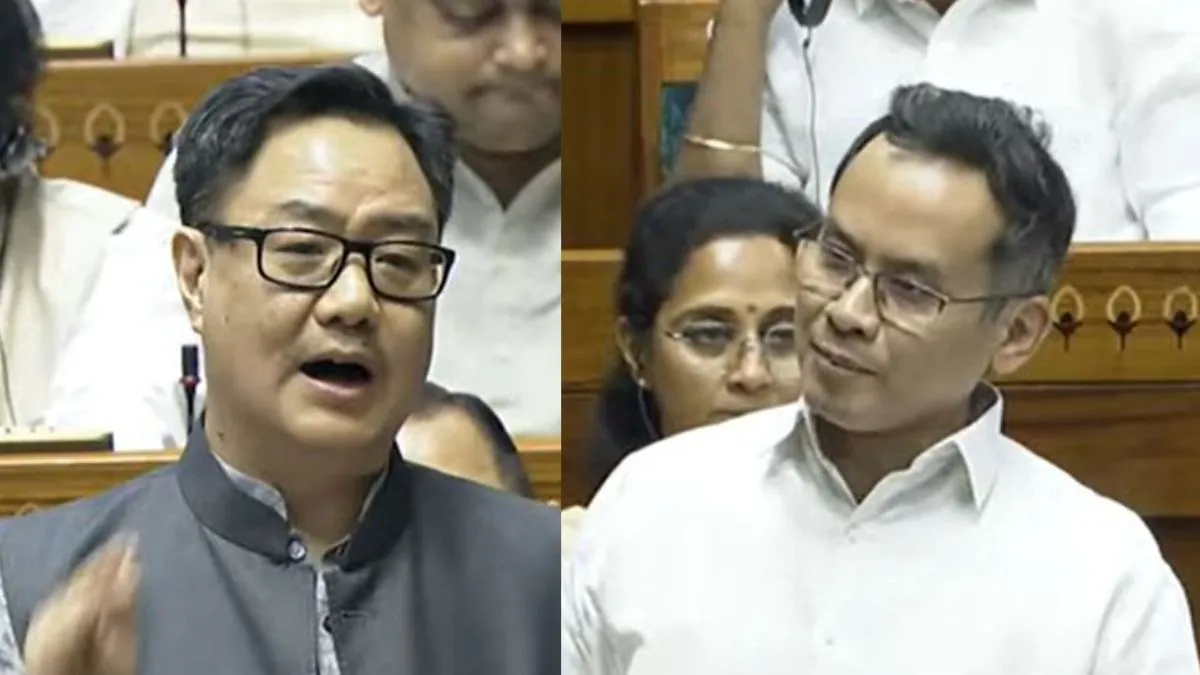- By Nidhi Giri
- Wed, 02 Apr 2025 04:03 PM (IST)
- Source:JND
The Lok Sabha session kicked off on a stormy note on Wednesday, April 2, as Union Minority Affairs Minister Kiren Rijiju tabled the Waqf (Amendment) Bill, 2024. NDA and Opposition traded barbs as the discussion continued on the bill. Rijiju alleged that the Congress handed over 123 government properties to the Waqf Board. Expressing a stern stance against today's Waqf Board's working, Rijiju said that the Congress-led UPA government would have given the Parliament to the Waqf if not stopped. Rijiju’s speech was rebutted by Congress MP Gaurav Gogoi, who first accused Rijiju of making "misleading statements" and labelled the Waqf amendments "an assault on the Constitution".
Kiren Rijiju Blasts UPA Government
"A case going on since 1970 in Delhi involved several properties, including the Parliament building. The Delhi Waqf Board had claimed these... the case was in court but then the UPA denotified 123 properties and gave them to the Waqf Board," the Union Minister said on the 'Parliament to Waqf' charge.
“If we had not introduced this amendment today, even the building we are sitting in could have been claimed as Waqf property. If Prime Minister Narendra Modi's government did not come to power... several other properties would also have been de-notified," the Union Minister said.
READ MORE: PM Modi Receives 'Weird' Praise From Chilean President: 'You Can Talk To Any World Leader'
"Property Management Issue..."
Rijiju then criticised the opposition for standing against changes, insisting there will be no alterations to the management of mosques and that the amendments were "a property management issue".
"The government has nothing to do with religious sentiments," he said, pointing out, "The role of Waqf boards is to supervise management of Waqf properties... this (the proposed law) is purely a provision for governance and supervision. It is simply a matter of property management."
"If someone fails to understand this basic distinction... or chooses not to... I have no answer."
Gaurav Gogoi Hits Back
Slamming the NDA-led government, Deputy Leader of Congress in Lok Sabha Gaurav Gogoi said, “This Bill is an attack on the basic structure of the constitution. Through this Bill, the government wants to dilute the constitution, defame the minority communities, divide the Indian society, and disenfranchise the minority communities. Recently, their double-engine governments did not allow people to read the namaz on roads. How many minority MPs do you have?” Meanwhile, the Union Minister also clarified that the Bill never intends to interfere in any religious practice or the management of any mosque.
Opposition Complains, Amit Shah Replies
Rijiju's fierce speech was preceded by a brief ruckus as NK Ramachandran of the Revolutionary Socialist Party rose to present a point of order. He questioned the authority of the joint parliamentary committee - which had been tasked last year with reviewing the original Bill - to make changes.
Ramachandran said that, by his interpretation of the rules, the JPC should not have introduced changes to the bill, as it had not been expressly authorised to do so by the House.
He was referring to the 14 changes (all suggested by MPs from the ruling BJP or allied parties, another point of contention with the opposition) that had been made by the committee.
These changes were cleared by the Union Cabinet in February.
Union Home Minister Amit Shah rose for a brief rebuttal.
Amit Shah said the committee - led by the BJP's Jagadambika Pal - had offered suggestions that were then accepted by the union government and not the committee itself.
Waqf (Amendment) Bill Timeline
The Waqf Amendment Bill was first tabled in the Lok Sabha in August last year amid furious protests from the opposition, which slammed the proposed law as "draconian". A day later it was sent to the committee, which filed its report in February after opposition MPs said their views had been ignored.
The BJP refuted that claims; panel member and Lok Sabha MP Aparajita Sarangi said Pal "tried to hear everybody out and gave sufficient time for everybody to move amendments..."
The JPC held nearly three dozen hearings in six months but many of those ended in chaos, and at least one in physical violence after Trinamool MP Kalyan Banerjee smashed a glass bottle on the table.
Eventually 66 changes were proposed, of which all 44 from the opposition were rejected while the 23 from BJP and allied parties were accepted. After a vote 14 of the 23 were cleared.
The removal of an annexure with dissent notes from the opposition triggered another row. The centre said the Chair had the discretion but, after talks, said the notes would be included.
The original draft of the Waqf Amendment Bill had proposed 44 changes.
These included nominating non-Muslim and (at least two) women members to each Waqf board, as well as a Union Minister, three MPs and persons of 'national repute'. There was also a proposal to limit donations from Muslims practicing their religion for at least five years.
(With Agency Inputs)

